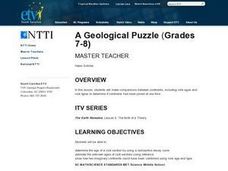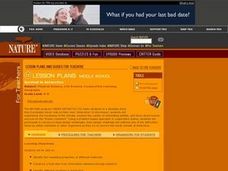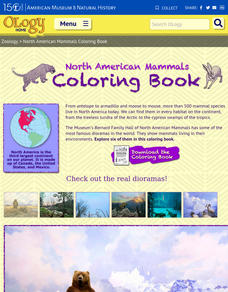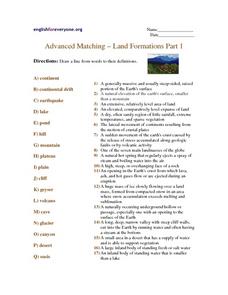Curated OER
Ecosystems Lesson Plan
Students research ecosystems (rainforest, desert, grassland, woodland, and arctic tundra). Students compare the seven continents and the importance of proximaty to the equator.
National Wildlife Federation
I Speak for the Polar Bears!
Climate change and weather extremes impact every species, but this lesson focuses on how these changes effect polar bears. After learning about the animal, scholars create maps of snow-ice coverage and examine the yearly variability and...
Curated OER
A Geological Puzzle
Students compare and contrast the various types of rocks on each continent. In groups, the calculate the rock ages and types to determine if the continents, in their opinion, were joined at one time. They develop two imaginary...
Science 4 Inquiry
Fluid Streams Affecting Weather
The jet stream can reach speeds of up to 250 miles per hour. Scholars learn about the jet stream and ocean currents as they rotate through stations. They answer questions leading them to understand the impact these fluid streams have on...
Curated OER
Endangered Species
In this geography worksheet, learners identify how to manipulate data on a range of endangered species. They create a bar graph of endangered animals from Africa, Asia, Australia, North America, or South America. Students use a...
Curated OER
Survival in Antarctica
Explore the harsh climate of Antarctica and its wildlife. Participate in experiments to determine how humans survive in the continent's climate, and address the difficulties faced by scientists.
American Museum of Natural History
North American Mammals Coloring Book
Seven pages offer scholars the opportunity to learn about North American mammals and boost their coloring skills. Animals include brown bears, beavers, jackrabbits, wolves, jaguar, and Dall sheep
Curated OER
Forces That Shape the Earth: Plate Movement
In this tectonic plate instructional activity, students learn about the movement of the plates that make up the earth's crust. They read about the Theory of Pangaea, lithosphere, divergence, convergence, and plate transformation....
Curated OER
Cacao Tree Geography
Students use a map to learn about where chocolate comes from. In this lesson on the cacao tree, students locate various regions where the cacao tree grows. They will discuss why the cacao tree grows more favorably in particular climates...
Curated OER
Advanced Matching--Land Formations Part 1
Using this activity, learners could review information they have covered about land forms, such as hills, mountains and plateaus. This 17 question activity could be used with upper elementary or ESL students to test or review information...
Curated OER
Movement of Air Mind Map Activity
Students explore the movement of air. In this air activity, students discuss and give examples of air ventilation. Students compare outdoor and indoor air quality. Students create mind maps as a visual representation of...
Curated OER
It's Going to Blow Up!
Get your ocean explorers online, reading articles about submarine volcanoes. They answer a series of questions and take a geometery challenge in which they calculate how much of a volcano has been blown away. Make sure to explore several...
Curated OER
PLATE MOVEMENTS AND CLIMATE CHANGE
Young scholars label three geological maps with continents provided to analyze the relationships between the movement of tectonic plates and the changes in the climate. In small groups, they discuss their findings and form hypotheses...
Curated OER
A Crust Full of Rocks
In this rock worksheet, young scholars answer seven short answer questions about the composition of the earth's crust. Questions refer to metamorphic, igneous, and sedimentary rocks.
Curated OER
Cranes, Crosswalks, and Big Gulps
Students watch a video and answer questions based on wildlife jobs. In this wildlife lesson plan, students learn that biologists don't just play with animals but that there is a lot of study involved.
Curated OER
Watercolor Ways
Students investigate the concept of being part of a global community. In this global community lesson, students learning the definition of stewardship as it relates to taking care of the Earth. They listen to the lyrics of the song,...
Curated OER
The Earth is an Orange
Students examine and identify the various types of maps. Using two types of maps, they compare the data that can be gathered from each one. They also identify and locate the continents and the oceans. They review the purposes of each...
Curated OER
Preserving Paradise
Students read an online article to study about the death of Joan Root. They research endangered ecosystems around the world and design ad campaigns to create public awareness.
Curated OER
WWW = World Wide Wildlife
Through video, internet research, and hands-on activities, learners conduct a study of the interdependence between animals and the habitats they live in. They conduct Internet research independently in order to complete a report on a...
Curated OER
My Friend, the Volcano
Working in cooperative groups, young scientists research and report on how undersea volcanic activity may benefit marine ecosystems. There are many links to websites that you can use to stimulate curiosity or for pupils to use for...
Curated OER
Deep Blue Sea
Elementary schoolers identify the ocean floor in a geological sense. They create a presentation that highlights the key features of the ocean floor. This terrific lesson plan has excellent streaming video segments embedded in it, and the...
Curated OER
Geographic Regions and Backyard Geology with the USGS Tapestry Map
A beautiful tapestry map of North America is examined by geology masters. The map incorporates the topography and geology of different regions. You can purchase printed copies or a large poster of the map, or if you have a computer lab...
Curated OER
Backyard Bacteria
Young scholars demonstrate safe ways to handle bacteria, prepare agar plates, and grow bacterial cultures. They identify different kinds of bacterial colonies, and devise a controlled experiment.
Curated OER
Paper Mache Globes
Third graders create a paper mache model of the earth. At the conclusion of a discussion about the earth, they are given paper mache materials, they create their globe and appropriately draw and label landforms, bodies of water and the...























